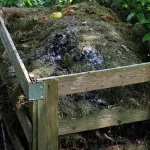Composting is an environmentally friendly strategy for recycling kitchen waste into a nutrient-rich soil conditioner. It's typically a simple method that requires only brown materials like leaves or newspaper and green materials like food waste, water, and time.
However, many people may not realize the critical role that fishing worms play in creating a healthier compost pile. But can you use fishing worms for composting? Let’s dive deeper into this fascinating subject.
The Basics of Composting
Composting primarily reutilizes organic matter that would otherwise be disposed of in landfills. Two types of elements are needed for effective composting: green materials, which are sources of nitrogen and include fruit and vegetable scraps, coffee grounds, and grass clippings, and brown materials, which are sources of carbon and consist of branches, leaves, paper shredders, etc.
The hot composting process makes these elements decompose rapidly with the aid of microorganisms under controlled moisture and temperature conditions.
The Role of Worms in Composting
While bacteria play a significant part in breaking down your compost pile’s components into a rich substance that benefits plant growth, worms can also greatly contribute to this decomposition process. They feed on organic matter within the heap and excrete castings – nutrient-dense feces that enhance soil health and fertility.
The term ‘worm composting’ is often associated with ‘vermicomposting,' an approach using specific species of worms (particularly red wigglers) to improve the speed and efficiency of composting while also producing valuable worm castings. However, it might surprise many that fishing worms (known as earthworms) also hold similar potential as their red wiggler counterparts when used in compost piles.
Turning Fishing Worms Into Compost Helpers
Fishing worms commonly found in bait shops are indeed capable contributors to the composting process. These earthworms, recognized scientifically as Lumbricus terrestris, naturally tend to burrow deep into the soil and consume organic matter. This behavior can be exploited for composting.
Earthworms pass organic material through their digestive system, breaking it down into smaller components. The excreted waste, known as worm castings, is rich in nutrients and beneficial microbes. It provides an excellent, balanced plant food resource and greatly improves soil structure when mixed with garden soil or used as potting compost.
To use fishing worms for composting, you must establish a conducive environment in your compost bin or pile to promote their survival and reproduction. This includes maintaining adequate moisture levels (worms thrive best in environments that are about 80-90% water), providing a steady supply of organic matter for them to feed on, and ensuring protection from extreme temperature fluctuations.
Considerations When Using Fishing Worms for Composting
While fishing worms may be used in composting, it's important to remember that they behave differently than red wigglers, which are typically used in vermicomposting. Fishing worms are naturally deep burrowers rather than surface dwellers like red wigglers.
If you use fishing worms in your open-bottomed compost bin or pile them directly on the ground, expect them to dig deep rather than stay close to the surface, yoking through your fresh kitchen scraps.
Indeed, fishing worms can effectively engage nature's little helpers in turning your kitchen waste into nutrient-rich compost. However, it requires more patience than traditional vermicomposting techniques since fishing worms have different behavioral patterns.
Understanding these differences will help you create an effective system tailored to them. With proper conditions met and a regular supply of organic matter, these earth-burrowing creatures can be potent allies in your green thumb quest. They will allow you to practice sustainable waste management while naturally enriching your soil's health and fertility.

Lifelong bacon junkie. Lifelong internet fanatic. Hipster-friendly travel aficionado. Twitter lover. Avid food buff. Incurable travel trailblazer.













